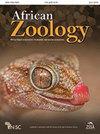Diet of a Generalist Mammalian Mesocarnivore in an Urban Matrix
IF 0.5
4区 生物学
Q4 ZOOLOGY
引用次数: 0
Abstract
Anthropogenic habitat conversion through urban sprawl is driving mesocarnivores to modify their behaviour and ecology. Thorough knowledge of their feeding ecology is fundamental in understanding the pressures imposed on mesocarnivores by urbanisation. The diet of the water mongoose Atilax paludinosus has been studied in natural habitats of KwaZulu-Natal, South Africa. However, its urban conspecifics have been mostly overlooked. We used scat analysis to investigate the feeding ecology of water mongooses in the urban greenspace matrix of the Upper Highway Area of eThekwini, KwaZulu-Natal Province. We analysed dietary intake trends using relative percentage of occurrence, based on 105 scat samples collected in 2018–2019. Urban water mongooses opportunistically consumed a wide array of prey items. Their diet was dominated by three main categories: crustaceans 35.9%, rodents 19.6%, and invertebrates 18.4%. Seasonal variation was only detected for crustaceans and rodents. We found chicken bones, plastic particulates and cigarette butts in the scat samples. This indicated that water mongooses in an urban landscape were supplementing their diet by foraging on anthropogenic waste. Our study highlights the generalist and flexible feeding habits of water mongooses in an urban matrix.城市矩阵中一种普通哺乳动物中食肉动物的饮食
城市扩张导致的人为栖息地转换促使中食肉动物改变其行为和生态。深入了解它们的觅食生态是理解城市化给中食肉动物带来的压力的基础。在南非夸祖鲁-纳塔尔的自然栖息地,对水猫鼬Atilax paludinosus的饮食进行了研究。然而,它的城市同类大多被忽视了。我们使用scat分析法调查了夸祖鲁-纳塔尔省eThekwini上高速公路地区城市绿地基质中水猫鼬的觅食生态。我们根据2018-2019年收集的105份粪便样本,使用相对发生率分析了饮食摄入趋势。城市水猫鼬机会主义地吃掉了大量猎物。它们的饮食主要分为三类:甲壳类动物35.9%,啮齿动物19.6%,无脊椎动物18.4%。我们在粪便样本中发现了鸡骨头、塑料颗粒和烟蒂。这表明城市景观中的水猫鼬通过觅食人类排泄物来补充它们的饮食。我们的研究强调了城市基质中水猫鼬的广泛而灵活的进食习惯。
本文章由计算机程序翻译,如有差异,请以英文原文为准。
求助全文
约1分钟内获得全文
求助全文
来源期刊

African Zoology
生物-动物学
CiteScore
2.60
自引率
9.10%
发文量
18
审稿时长
>12 weeks
期刊介绍:
African Zoology , a peer-reviewed research journal, publishes original scientific contributions and critical reviews that focus principally on African fauna in terrestrial, freshwater, and marine ecosystems. Research from other regions that advances practical and theoretical aspects of zoology will be considered. Rigorous question-driven research in all aspects of zoology will take precedence over descriptive research. The Journal publishes full-length papers, critical reviews, short communications, letters to the editors as well as book reviews. Contributions based on purely observational, descriptive or anecdotal data will not be considered.
The Journal is produced by NISC in association with the Zoological Society of South Africa (ZSSA). Acceptance of papers is the responsibility of the Editors-in-Chief in consultation with the Editors and members of the Editorial Advisory Board. All views expressed are those of the author and not necessarily those of the Editors or the Department.
 求助内容:
求助内容: 应助结果提醒方式:
应助结果提醒方式:


